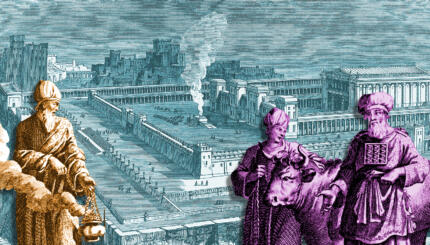Caro the Lawyer
Joseph Caro (1488-1575) [was an] outstanding lawyer and mystic. Caro was probably born in Toledo but, after the expulsion of the Jews from Spain in 1492, his family settled in Turkey where Caro lived for around forty years, acquiring a great reputation as an authority on Jewish law. In 1536 he left Turkey for Safed, serving there until his death as a rabbi and head of a yeshivah. In Safed he became closely associated with the mystical circle that flourished there.
Caro wrote a commentary, entitled Kesef Mishnah, to Maimonides’ code and another commentary, his greatest work, on the Tur of Jacob ben Asher, to which he gave the title Bet Yosef (House of Joseph), because in it he provided a home for all of the legal opinions held by the jurists of the past.
In his introduction to Bet Yosef, Caro remarks that he was moved to compile it because there was so much uncertainty about the actual law in practice, each Jewish community seeming to have its own “Torah.” The Tur, he thought, is the best starting point for the task he had set himself, since in this work, too, many different opinions are recorded. But Caro seeks to go further than the Tur in an analysis of the law as it develops from Talmudic times down to his own day. The Bet Yosef is probably the keenest work of legal analysis in the history of Jewish law.
Caro recorded the decisions in every branch of practical law at which he had arrived in his digest, the Shulchan Aruch [“Set Table”], which together with the glosses of Isserles, became the standard code for all Orthodox Jews. [Moses Isserles (d.1572) was a Polish rabbi who authored several works on Jewish law. His claim to fame, however, was his glosses to Caro’s Shulchan Aruch. Caro meant to provide a clear ruling on all matters of halacha, according to Sephardic teachings. Isserles brought Ashkenazi opinions and customs to the “table.” Isserles titled his collection of additions, Mappah (tablecloth). From 1569 the Shulchan Aruch has included Isserles’ additions.]
With your help, My Jewish Learning can provide endless opportunities for learning, connection and discovery.
Caro the Mystic
It is highly interesting that Caro, evidently in compensation for his powerful concentration throughout his life on acute legal subtleties, had strong mystical tendencies, believing himself to be the recipient of a heavenly mentor. This phenomenon was not uncommon among the kabbalists, who called the spirit who brought the revelation a Maggid (“Preacher” or “Teller”). Caro identified his Maggid with the spirit of the Mishnah and with the Shekhinah. The revelations of the Maggidwere sometimes in the form of automatic speech coming out of Caro’s mouth.
Solomon Alkabetz (d. 1576), author of the (Sabbath) hymn Lekha Dodi, sent an eyewitness account of Caro’s visitation, in a letter from Safed to the mystic brotherhood in Salonika. Here Alkabetz states that during a mystic vigil on the eve of the festival of Shavuot the companions heard a voice speaking out of Caro’s mouth. “It was a loud voice with letters clearly enunciated. All the companions heard the voice but were unable to understand what was said. It was an exceedingly pleasant voice becoming increasingly strong. We all fell upon our faces and none of us had any spirit left in him because of our great dread and awe.” Alkabetz then records what the voice said, evidently able to decipher the message.
Caro kept a mystical diary for around forty years in which he recorded the Maggid’srevelations. This work, entitled, Maggid Mesharim (Teller of Upright Words) was first published in Amsterdam in 1704. (The letter of Alkabetz is printed as the introduction to the work) Followers of the Haskalah, embarrassed that one of their heroes, with his keen logical mind should have kept a mystical diary, denied that Caro was the author of the Maggid Mesharim. But its authenticity has been demonstrated beyond doubt.
Students of religious psychology have found rich material for their investigations in the Maggid Mesharim, among other things that in its non-mystical sections the work falls short of Caro’s own acute reasoning. As [Rabbi ] Zevi Ashkenazi [1658-1718, served in Vilna, Budapest, Sarajevo, Amsterdam, London and Lemberg] was reported to have said, “Caro was a far greater scholar than his Maggid.”
Another fascinating feature of the Maggid Mesharim is the manner in which the Maggidaddresses Caro, rebuking him for his shortcomings an holding out to him promise of his future greatness and assuring him that one day he would be worthy of suffering martyrdom for his religion. Whatever one is to make of Caro’s mystical activities, the lie is given to the notion that legalism in religion is incompatible with the mystical approach.
This article is reprinted with permission from The Jewish Religion: A Companion, published by Oxford University Press.
Ashkenazi
Pronounced: AHSH-ken-AH-zee, Origin: Hebrew, Jews of Central and Eastern European origin.
Mishnah
Pronounced: MISH-nuh, Origin: Hebrew, code of Jewish law compiled in the first centuries of the Common Era. Together with the Gemara, it makes up the Talmud.
Sephardic
Pronounced: seh-FAR-dik, Origin: Hebrew, describing Jews descending from the Jews of Spain.
Shavuot
Pronounced: shah-voo-OTE (oo as in boot), also shah-VOO-us, Origin: Hebrew, the holiday celebrating the giving of the Torah at Mount Sinai, falls in the Hebrew month Sivan, which usually coincides with May or June.
halacha
Pronounced: hah-lah-KHAH or huh-LUKH-uh, Origin: Hebrew, Jewish law.


